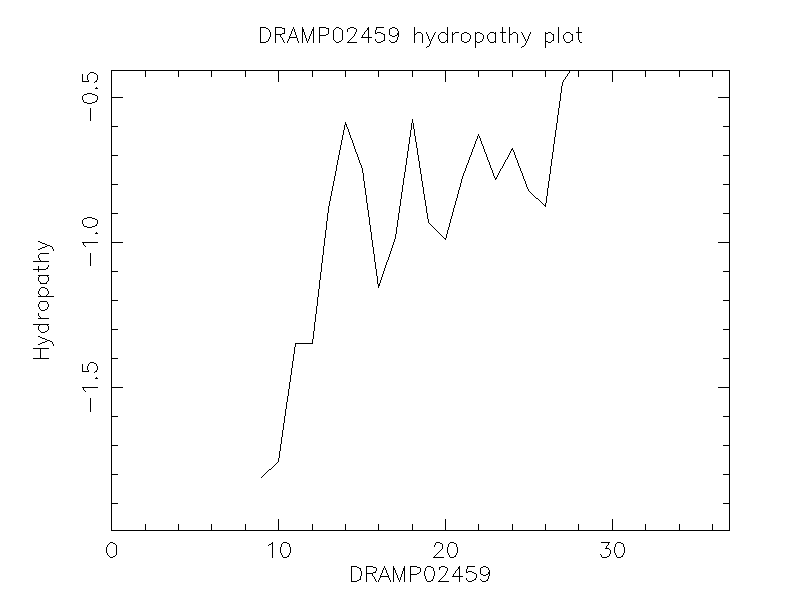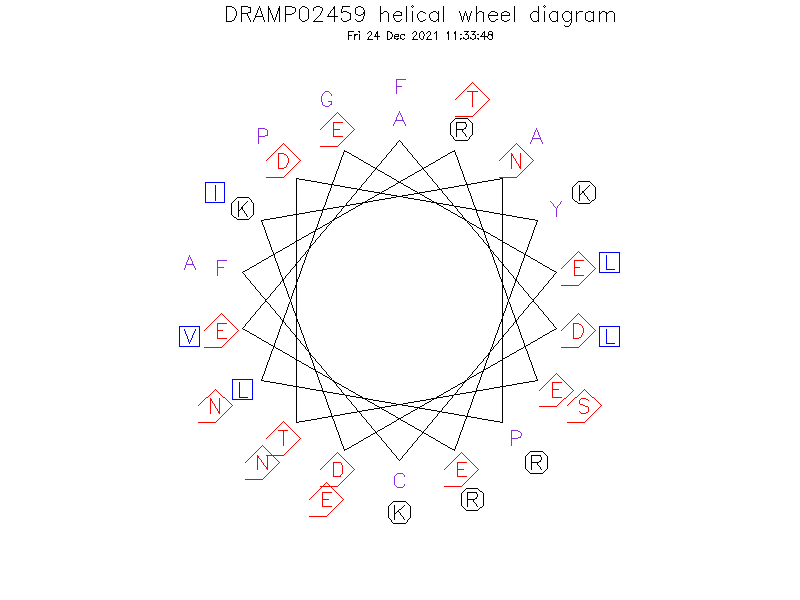General Information
-
DRAMP ID
- DRAMP02459
-
Peptide Name
- L-amino-acid oxidase (BjarLAAO-I; LAAO; LAO; snakes, reptils, animals)
-
Source
- Bothrops jararaca (Jararaca)
-
Family
- Belongs to the flavin monoamine oxidase family (FIG1 subfamily)
-
Gene
- Not found
-
Sequence
- ADDKNPLEECFRETDYEEFLEIARNGLKATSNPKRVV
-
Sequence Length
- 37
-
UniProt Entry
- P0DI88
-
Protein Existence
- Protein level
Activity Information
-
Biological Activity
- Antimicrobial, Antibacterial, Anti-Gram+, Antiparasitic, Antitumor
-
Target Organism
-
- Gram-positive bacterium: S. aureus.
-
Hemolytic Activity
-
- No hemolysis information or data found in the reference(s) presented in this entry
-
Cytotoxicity
-
- Not included yet
-
Binding Target
- Not found
Structure Information
-
Linear/Cyclic
- Not included yet
-
N-terminal Modification
- Not included yet
-
C-terminal Modification
- Not included yet
-
Nonterminal Modifications and Unusual Amino Acids
- Not included yet
-
Stereochemistry
- Not included yet
-
Structure
- Not found
-
Structure Description
- Not found
-
Helical Wheel Diagram
-
PDB ID
- None
-
Predicted Structure
- There is no predicted structure for DRAMP02459.
Physicochemical Information
-
Formula
- C186H294N52O63S
Absent Amino Acids
- HMQW
Common Amino Acids
- E
Mass
- 4298.75
PI
- 4.65
Basic Residues
- 6
Acidic Residues
- 9
Hydrophobic Residues
- 11
Net Charge
- -3
-
Boman Index
- -115.66
Hydrophobicity
- -0.987
Aliphatic Index
- 65.95
Half Life
-
- Mammalian:4.4 hour
- Yeast:>20 hour
- E.coli:>10 hour
Extinction Coefficient Cystines
- 1490
Absorbance 280nm
- 41.39
Polar Residues
- 9
DRAMP02459

Comments Information
Function
- Catalyzes an oxidative deamination of predominantly hydrophobic and aromatic L-amino acids (L-Met, L-Leu, L-Phe, L-Ile), thus producing hydrogen peroxide that may contribute to the diverse toxic effects of this enzyme. Exhibits diverse biological activities, such as hemorrhage, edema, apoptosis of vascular endothelial cells or tumor cell lines, as well as regulation of platelet aggregation. Effects of snake L-amino oxidases on platelets are controversial, since they either induce aggregation or inhibit agonist-induced aggregation. These different effects are probably due to different experimental conditions By similarity. This protein induce hemolysis and has antibacterial and antiparasitic activities (against the Gram-positive S.aureus). Tested in vivo, this protein significantly inhibits Ehrlich ascite tumors growth and induces an influx of polymorphonuclear cells, as well as spontaneous liberation of hydrogen peroxide from peritoneal macrophages.
Tissue specificity
- Expressed by the venom gland.
Miscellaneous
- Has parasiticidal activities against both trypanosomes and leishmania, as a result of enzyme-catalyzed hydrogen peroxide production.
Literature Information
- ·Literature 1
-
Title
- Antitumoural effect of an L-amino acid oxidase isolated from Bothrops jararaca snake venom.
-
Pubmed ID
- 18346051
-
Reference
- Basic Clin Pharmacol Toxicol. 2008 Jun;102(6):533-542.
-
Author
- de Vieira Santos MM, Sant'Ana CD, Giglio JR, da Silva RJ, Sampaio SV, Soares AM, Fecchio D.
- ·Literature 2
-
Title
- Antigenic, microbicidal and antiparasitic properties of an L-amino acid oxidase isolated from Bothrops jararaca snake venom.
-
Pubmed ID
- 19101583
-
Reference
- Toxicon. 2009 Mar 1;53(3):330-341.
-
Author
- Ciscotto P, Machado de Avila RA, Coelho EA, Oliveira J, Diniz CG, Farías LM, de Carvalho MA, Maria WS, Sanchez EF, Borges A, Chávez-Olórtegui C.
- ·Literature 3
-
Title
- L-amino acid oxidase activity present in fractions of Bothrops jararaca venom is responsible for the Induction: of programmed cell death in Trypanosoma cruzi.
-
Pubmed ID
- 20615423
-
Reference
- Toxicon. 2010 Nov;56(6):944-955.
-
Author
- olindo P, Teixeira-Ferreira AS, DaMatta RA, Alves EW.

